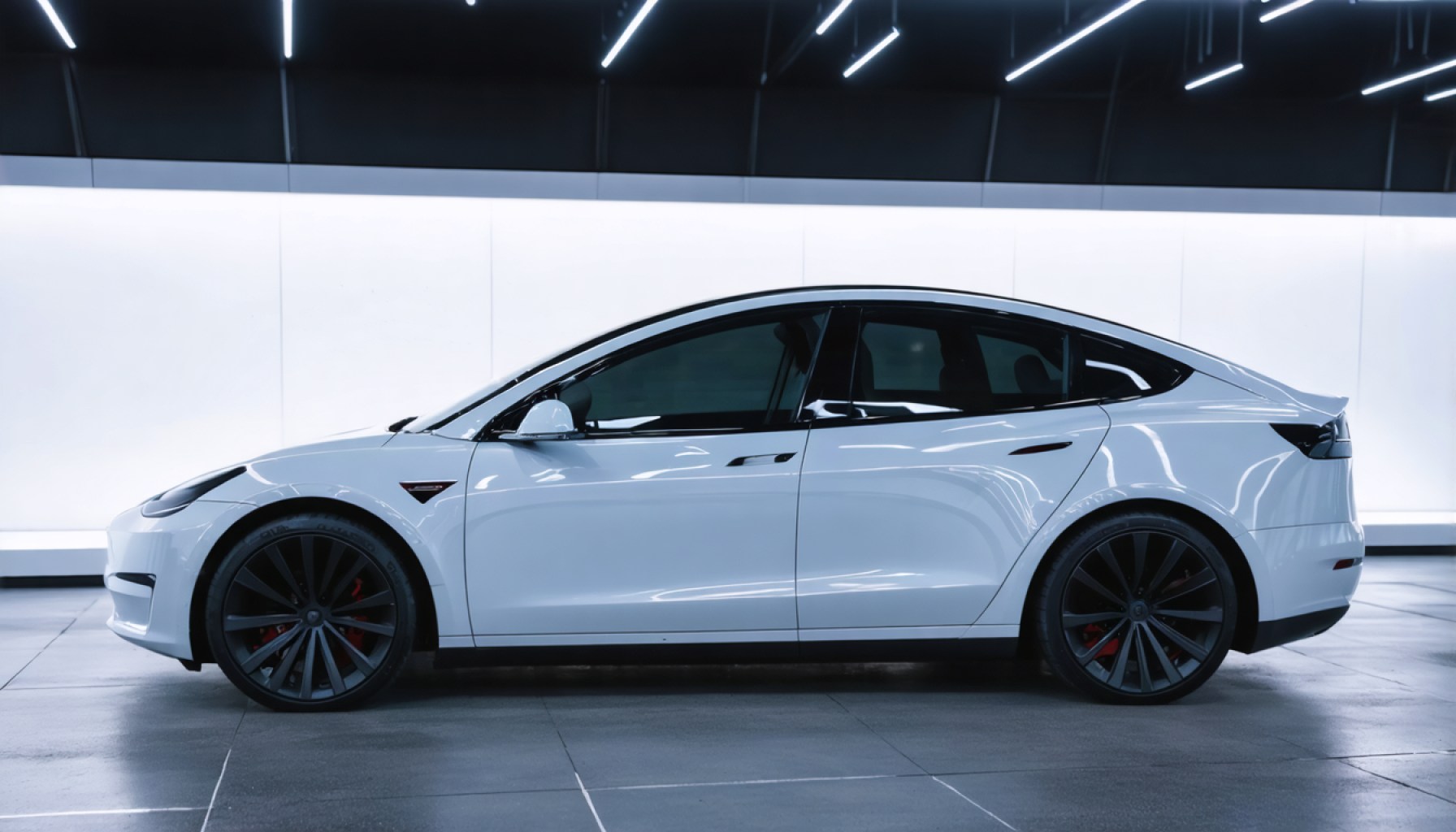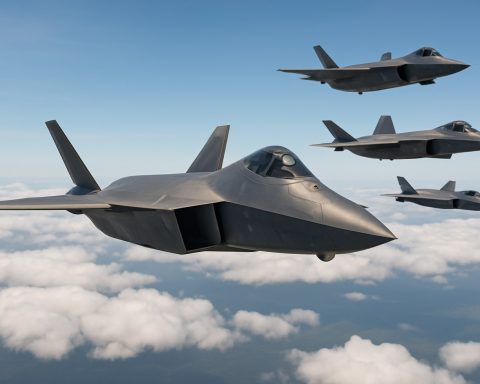- Tesla enters Saudi Arabia amidst global sales decline and market controversies, aiming to electrify the oil-rich nation.
- The company plans a spectacular launch event on April 10, featuring electric vehicles, autonomous driving, and the Optimus humanoid robot.
- Saudi Arabia’s current electric vehicle market is just over 1%, offering Tesla a promising yet challenging opportunity for growth.
- Global challenges for Tesla include a 1% annual sales drop and fierce competition from BYD in China with innovative charging solutions.
- Elon Musk’s controversial role in U.S. governance has sparked unrest, impacting Tesla’s brand and share value, which plummeted by 40% since December.
- Tesla’s expansion in the Middle East is a pivotal moment, representing both risks and potential for transformative change.
Amid swirling controversy and plummeting sales figures, Tesla is embarking on a bold journey into the heart of the Middle East. The electric vehicle giant is set to make a grand entrance into Saudi Arabia, a nation synonymous with its oil reserves yet ripe for an electric transformation. This intriguing move is more than just a business expansion; it’s a statement placed against the backdrop of dwindling global sales and a storm of political and market turbulence.
Under the glare of the Arabian sun, Tesla will host a dazzling launch event on April 10 in the kingdom. The company promises not only a showcase of its cutting-edge electric vehicles but a futuristic glimpse of autonomous driving through their Cybercab innovation. Adding an allure of science fiction, Tesla introduces Optimus, their humanoid robot, heralding advancements in AI and robotics that whisper of tomorrow’s possibilities today.
Key facts paint Saudi Arabia as fertile ground yet fraught with challenges for Tesla’s electrifying narrative. According to recent studies, electric vehicles account for just over 1% of the market in this oil-rich desert nation—a stark reminder of traditional energy’s stronghold. Yet this presents a thrilling opportunity for Tesla to be the harbinger of change, sparking an electric revolution.
Globally, Elon Musk and his brainchild face a labyrinth of trials. In 2024, Tesla grappled with its first-ever annual sales decline, a negligible yet symbolic 1% drop that underscored a significant pivot in its trajectory. Across the vast markets of China, competition is fierce. Chinese juggernaut BYD has outpaced Tesla, unveiling a game-changing ultra-fast charger, setting a blistering pace with a 250-mile charge in mere minutes.
Tesla’s struggles extend beyond market dynamics into the realm of governance where Musk has stirred controversy as the controversial head of the Department of Government Efficiency in the U.S. This role has cast shadows over his brand, inciting unrest and vandalism at Tesla locales, prompting an FBI task force intervention. Meanwhile, peaceful protests echo with chants demanding change.
Shares of the pioneering company have nosedived by 40% since its zenith in December, reflecting investor anxiety and the mixed signals of an unpredictable market.
In this complex tableau, Tesla’s Saudi debut may illuminate a path forward, presenting a dual narrative: one of daunting surroundings and infinite potential. The question hangs heavily in the air—can Tesla’s spark ignite the Middle East’s green revolution, or will the sands of tradition snuff it out? As the company revs its engines into the heart of one of the world’s richest economies, the world watches with bated breath, eager to see if this is a turning tide or just another ripple.
Tesla’s Bold Middle East Gamble: Will Saudi Arabia’s Oil Fields Turn Green?
Tesla’s ambitious expansion into Saudi Arabia marks a fascinating intersection of tradition and innovation—a daring venture into a land of oil yet burgeoning with potential for electrification. This article delves into the critical facets of Tesla’s new campaign, explores its potential impacts, and provides actionable insights.
Saudi Arabia: A Land of Opportunity and Challenge for Tesla
While Tesla’s launch in Saudi Arabia is a groundbreaking move, it comes with its set of challenges and immense potential opportunities. The decision to introduce the Cybercab and Optimus robot suggests that Tesla is not merely focusing on vehicle sales but is presenting itself as a leader in futuristic technology.
Real-World Use Cases and Industry Context
– EV Adoption in Oil-Rich Nations: With only about 1% of the current automotive market dedicated to electric vehicles, Saudi Arabia represents a strategic frontier for Tesla. Current market projections suggest a slow but steady increase in EV adoption, aligning with global environmental goals and local diversification strategies like Vision 2030.
– Autonomous Driving in Urban Planning: The introduction of autonomous vehicles could potentially reshape urban planning in Saudi cities, fostering more efficient traffic management and reduced environmental impact.
Market Forecasts and Industry Trends
– Competition and Market Strategy: As Tesla enters this nascent market, it faces competitors like Lucid Motors and potential new entrants. Strategic partnerships and localized manufacturing could be key to gaining market leverage.
– Projected EV Market Growth: According to EV sales forecasts, the Middle East could see a compounded annual growth rate of over 30% in EV sales through 2030, with Saudi Arabia as a significant player in this growth.
Elon Musk’s Leadership: A Double-Edged Sword?
Elon Musk remains a polarizing figure, doubling as an asset and a liability for Tesla’s image. His simultaneous roles in governmental advisory and Tesla’s helm have contributed to both innovations and controversies. This dual-role choice has pushed Tesla into the political realm, sometimes at the expense of its corporate image.
Insights & Predictions
– Stock and Investor Sentiment: Following the 40% decline since December is indicative of investor trepidation. Future performance hinges on successful expansion and brand perception management.
– Technological Integration: Innovations such as Optimus present far-reaching possibilities beyond the auto industry, potentially influencing areas like workforce automation and manufacturing.
Quick Tips and Recommendations
1. Focus on Localization: Adapting products to meet regional customer preferences and government regulations will be critical for success in the Saudi market.
2. Strengthen Infrastructure Collaboration: Partnering with local governments and businesses to build EV infrastructure will accelerate market adoption.
3. Sustainability Messaging: Amplifying green energy motivations and aligning with Saudi Arabia’s Vision 2030 goals could bolster brand image and appeal.
Final Thoughts
Tesla’s venture into Saudi Arabia is a high-stakes game. The rewards could be monumental, both for Tesla and for Saudi Arabia’s diversification efforts. With strategic foresight, Tesla could indeed spark an electric revolution in the heart of the Middle East, turning the kingdom’s oil-rich sands into green pastures of opportunity.
For more insights on electric vehicle trends, visit Tesla’s official website. For broader news on tech innovations, head over to TechCrunch.







